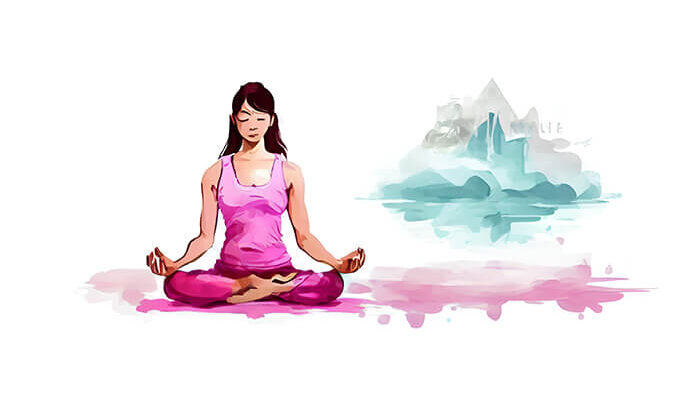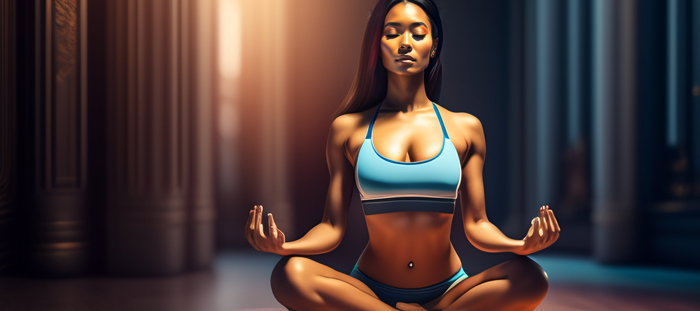How to Meditate Properly: A Beginner’s Guide
Meditation is a practice that can bring many benefits to your life, such as reducing stress, improving focus, enhancing well-being, and connecting with yourself and others But how do you meditate properly? What are the best techniques and tips for beginners? In this blog post, we will answer these questions and help you start your meditation journey.
What is meditation?
Meditation is a practice derived from Hinduism and Buddhism. The goal of meditation is to focus and understand your mind—eventually reaching a higher level of awareness and inner calm Meditation is not about emptying your mind or stopping your thoughts. Rather, it is about observing your thoughts and feelings without judgment and letting them come and go naturally
How to meditate properly?
While there are many different types of meditation, such as mindfulness, mantra, visualization, loving-kindness, etc., some basic steps are common to most of them. Here are some tips on how to meditate properly:
- Choose a quiet, peaceful environment. Find a place where you will not be interrupted or distracted by noise, people, or devices. You can meditate indoors or outdoors, as long as you feel comfortable and relaxed.
- Wear comfortable clothes. You don’t want to feel any physical discomfort or tightness while meditating. Wear loose-fitting clothes that allow you to breathe freely and move easily. You can also remove your shoes and accessories if you wish.
- Sit comfortably. You can sit on a chair, a cushion, a mat, or the floor. The important thing is to keep your back straight but not tense, your shoulders relaxed, and your head balanced. You can rest your hands on your lap or knees, or hold them together in front of your chest.
- Close your eyes and focus on your breathing. This is the simplest way to start meditating. Just pay attention to the natural rhythm of your breath, without trying to change it or control it. Notice how the air flows in and out of your nostrils, how your chest and abdomen rise and fall, how your body feels with each breath.
- Choose a specific period of time. You can use a timer or an app to set the duration of your meditation session. Start with a short time, such as 5 or 10 minutes, and gradually increase it as you become more comfortable and experienced. Don’t worry about how long you should meditate; the quality of your attention is more important than the quantity of time.
- Increase the length of future meditation sessions until you find a duration and technique that works for you. There is no one-size-fits-all formula for meditation. You can experiment with different methods, such as repeating a word or phrase (mantra), visualizing a positive image or scene (visualization), sending love and compassion to yourself and others (loving-kindness), etc. Find what resonates with you and makes you feel calm and happy.
What are the benefits of meditation?
Meditation has many benefits for your physical, mental, and emotional health. Some of the benefits are:
- Reduced stress and anxiety. Meditation can help you cope with stressful situations by lowering your cortisol levels (the stress hormone) and increasing your endorphins (the feel-good chemicals). Meditation can also help you calm your nervous system and relax your muscles.
- Improved concentration and memory. Meditation can enhance your cognitive abilities by increasing your brain’s gray matter (the tissue responsible for learning and thinking) and improving your focus and attention span.
- Enhanced well-being and happiness. Meditation can boost your mood by increasing your serotonin levels (the happiness hormone) and reducing your negative emotions such as anger, fear, sadness, etc. Meditation can also help you develop a more positive outlook on life and appreciate the present moment.
- Increased self-awareness and compassion. Meditation can help you become more aware of yourself and your thoughts and feelings. This can help you understand yourself better, accept yourself more, and improve your self-esteem and confidence. Meditation can also help you cultivate empathy and kindness towards yourself and others.
Conclusion
Meditation is a simple yet powerful practice that can transform your life in many ways. By following these tips on how to meditate properly, you can start enjoying the benefits of meditation today.
If you liked this blog post, please share it with your friends and family who might be interested
Related Links:
- For more information on the benefits of meditation, you can visit this link
- For more tips on how to meditate properly, you can visit this link
- For more examples of different types of meditation, you can visit this link
- For more evidence on how meditation can help with stress and anxiety, you can visit this link
- For more insights on how meditation can improve your sleep quality, you can visit this link
























I couldn’t resist commenting